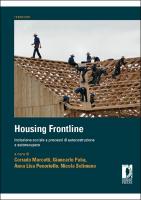Housing Frontline
Inclusione sociale e processi di autocostruzione e autorecupero
| dc.contributor.editor | Marcetti, Corrado | |
| dc.contributor.editor | Pecoriello, Anna Lisa | |
| dc.contributor.editor | Solimano, Nicola | |
| dc.contributor.editor | Paba, Giancarlo | |
| dc.date.accessioned | 2022-05-31T10:17:45Z | |
| dc.date.available | 2022-05-31T10:17:45Z | |
| dc.date.issued | 2011 | |
| dc.identifier | ONIX_20220531_9788866550822_234 | |
| dc.identifier | OCN: 854619741 | |
| dc.identifier.issn | 2704-579X | |
| dc.identifier.uri | https://library.oapen.org/handle/20.500.12657/54950 | |
| dc.language | Italian | |
| dc.relation.ispartofseries | Territori | |
| dc.title | Housing Frontline | |
| dc.title.alternative | Inclusione sociale e processi di autocostruzione e autorecupero | |
| dc.type | book | |
| oapen.abstract.otherlanguage | Over recent years, there has been a sharp increase in the various possible forms of poverty and housing vulnerability: from the total lack of shelter of the homeless to the risk of losing their home that now threatens numerous families in medium-low income brackets. At the same time, the traditional linear and standardised housing policies appear no longer adequate to address these phenomena. This book contains the results of a study entrusted by the Tuscan Regional Authority to a working group from the University of Florence and the Fondazione Giovanni Michelucci. The research explores the field of practices for self-production of housing in Italy and the world, through a critical selection of significant experiences, revealing the architectural and social creativity exploited in a large variety of collective actions. The book also contains a reconstruction of housing problems in Tuscany and an overview of alternative approaches to housing policy. The last section is devoted to the research-action on the occupation of the Luzzi, the abandoned sanatorium on the border between Florence and Sesto Fiorentino, a case that illustrates the most significant contradictions and dilemmas gravitating around the housing issue for the new poor: the problem of homeless immigrants; the difficulty of the authorities in managing problems of extreme housing poverty; the role of the associations and organisations of social mediation, and the inherent complexity of achieving a participatory approach to social and town planning research. | |
| oapen.identifier.doi | 10.36253/978-88-6655-082-2 | |
| oapen.relation.isPublishedBy | bf65d21a-78e5-4ba2-983a-dbfa90962870 | |
| oapen.relation.isbn | 9788866550822 | |
| oapen.relation.isbn | 9788866550761 | |
| oapen.relation.isbn | 9788892736191 | |
| oapen.series.number | 9 | |
| oapen.pages | 220 | |
| oapen.place.publication | Firenze |

